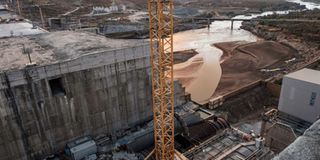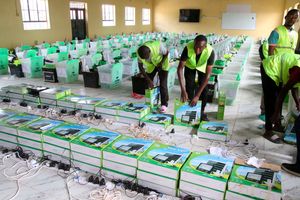Premium
Ethiopia bans flights over Nile dam area

A general view of the Blue Nile river as it passes through the Grand Renaissance Dam near Guba, Ethiopia.
What you need to know:
- Commercial or passenger flights, or any other types of flights, will not be allowed to fly through the area near the vicinity of the dam.
- However, those with a special permit may be allowed to fly in the restricted airspace.
Authorities in Addis Ababa on Monday shut down a part of the country's airspace in the Benishangul-Gumuz region, where the massive Grand Ethiopian Renaissance Dam (GERD) is being built.
Officials cited security reasons behind the closure of that region's airspace amid unresolved issues between Ethiopia, Sudan and Egypt on the use of the waters of the Nile and dam itself.
"The ban was imposed after consultations with the Air Force and other relevant government and security bodies," Wosenyeleh Hunegnaw, the Director- General of the Ethiopian Civil Aviation Authority, told the media.
As a result, he said, commercial or passenger flights, or any other types of flights, will not be allowed to fly through the area near the vicinity of the dam.
"Such restrictions are common in the international arena to ensure a country's security," the director-general said.
"Ethiopia has also imposed the restrictions to ensure the safety of the dam," he said.
However, he said that those with a special permit may be allowed to fly in the restricted airspace.
In an interview with the state-run Ethiopian News Agency, Ethiopian Air Force Commander Brigadier-General Yilma Merdasa, said the country's air force is fully prepared to prevent any enemy attacks targeting the Nile dam.
The air force is armed with fighter and patrol jets that can stay on air for more than four hours to defend any enemy actions, he said.
"The Ethiopian Air Force is providing a 24-hour air surveillance of the country's airspace and particularly for the Renaissance Dam."
"Any threat of an air strike against GERD is not a concern for Ethiopia," the military official said, citing the country's current air defence capabilities.
It is not clear why the country would want to impose air space restrictions for the purpose of the dam's security if any potential air strike is not a concern at all.
The latest development comes two months after the Horn of Africa's nation filled the GERD reservoir in defiance of Sudan's and Egypt's warning not to fill the dam before a final deal is reached.
Khartoum and Cairo fear that Ethiopia's $4.8 billion mega dam project will eventually diminish their water share from the River Nile.
Addis Ababa, however, argues that its dam project, which will be Africa's largest, won't have any significant harm on the two countries.
Ethiopia further argues that the hydroelectric power plant project, being built some 30 km from the Sudanese border, will ease the severity of deadly flooding in Sudan.
The Africa Union (AU) brokered the last round of talks between Ethiopia, Sudan and Egypt which ended in August without any major breakthrough.
The three parties are yet to negotiate on the most outstanding issues -- rules for filling, particularly during drought season, and on the annual operation of the GERD.





